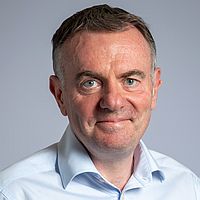Bringing communities together against a virus that seeks to drive us apart
07 May 2020
Director General Noel Curran talks about the impact of COVID-19 on public service media in an editorial first published in Broadcast in the UK.
At the start of the year, the future of public service media in many countries was under threat with governments questioning the need for a licence fee. Fast forward a few months and the world has changed in ways we couldn’t even imagine. And public service media has been there for every step of the journey, demonstrating the value they provide to citizens day in and day out.
We knew that public service media (PSM) is often where people turn first for trusted news and information. But the scale of the increase is dramatic and has happened right across the Continent. We’ve seen audiences for PSM evening news bulletins across Europe up by more than 20% on average and by over 40% among young viewers. The daily reach of PSM online news sites has almost tripled in most key markets.
But what I think the current crisis has demonstrated most acutely, is the role PSM has to play in supporting society on so many other fronts, be that providing educational content to supplement home-schooling, launching humanitarian campaigns, helping foster solidarity or tackling social isolation.
Our Members have found a myriad of ways to bring communities together against a virus that seeks to drive us apart. Whether that is the BBC’s network of local radio stations that are offering advice and co-ordinating community support. VRT in Belgium who are helping people share messages with their loved ones through daily UGC broadcasts. Or TVR in Romania’s campaign to showcase everyday acts of kindness.
It’s what public broadcasters do best – making connections with viewers and listeners, uniting audiences and ultimately making us all feel a little less alone in this world.
So what will the future look like for PSM post-coronavirus? You could argue, it has strengthened its central position in society – a national unifier, a source of trusted news and a treasure-trove of entertainment to audiences isolated at home.
However, the challenges facing the broadcast industry as a whole cannot be underestimated. All media is suffering. This is unprecedented.
For our Members, re-arranging schedules has been a costly business.
PSM funding was already under pressure before the crisis. As a proportion of GDP, PSM funding has shrunk over the last five years from 0.18% of GDP to 0.159% in the EBU area.
With some economists now predicting the worst recession in the post-war era, the financial forecasts for many public service broadcasters make for grim reading.
Some are already feeling the pressure – collection of the licence fee is being impaired in countries with strict lockdowns. For others, the hit will come later, especially in countries where funding is linked to external economic indicators, such as a proportion of GDP, or income-based taxes.
And there will be impacts in many other areas – the downturn in advertising (which provides 10% of funding for our Members); the disruption to live sport and events and the cancellation of scripted productions (down 61% since the start of the year) which could lead to an inflationary spiral for unscripted content to fill gaps in the schedule.
It’s also PSM’s responsibility to stimulate and support the wider broadcast industry. Many Members are helping bolster the independent production community such as ITV in the UK who have created a new £500,000 development fund, TG4 in Ireland who have announced a further three commissioning rounds for the independent sector or ARD and ZDF in Germany who are covering half the crisis-caused extra costs of those working on commissioned productions.
And our Members are also providing support to the broader creative industries whether that is increasing the amount of homegrown music played on their radio stations or investing in home-theatre experiences.
It is our job to ensure governments and authorities understand the essential role PSM has played and will continue to play in times of crisis such as this. Now is also the time for us to reach out to the rest of the European audio-visual sector and find common ground to lobby for support for European production, innovation and employment.
You cannot create a quality Newsroom overnight. You cannot win the trust of audiences in a week. You cannot instantly acquire the skill set to provide the range of output we’ve seen across Europe in this crisis. It requires time, it requires commitment, it requires investment and it requires public and government support.
Relevant links and documents
Written by




